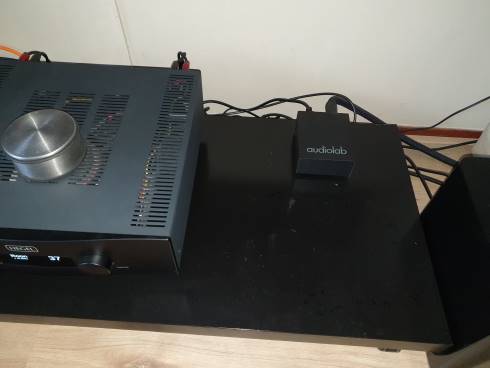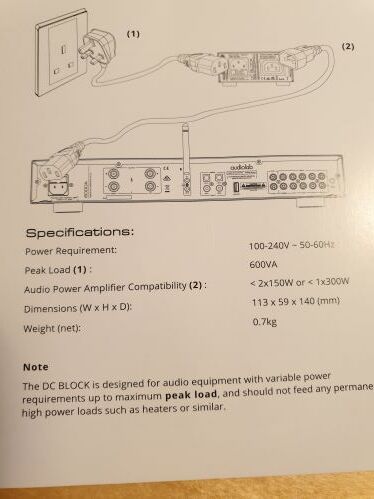I paid at a discount of $1800
Hegel H390 with a hummm, now connected via Audiolab DC blocker, the H390 is dead silent, at the same time I think the bass has become tighter and deeper and that for € 89 is a joke!!!

Hi Peter I’m sorry to say but you need to send it back. Its underpowered and we risk damaging both units by using it. It is rated for 150 Watts max. I didn’t know as well but someone in this thread made me aware of it.
Please see the warning right at the top of my initial first post.
Have been using this Audiolab DC Block for 5 months now to my full satisfaction, that the whole thing is going to explode is utter nonsense, hahaha, hereby added the Specifications! 1 X 300W
Device is stone cold in full use, so it makes no sense for me to worry about that.

I’m not here to tell you what to do just giving you information so you can make an educated decision whatever that is.
Its rated for either L+R = 150 Watts (H390 is capable of 250 Watts L+R) OR 300 Watts MONO (Hegel has 500 Watts @ 8 Ohms, 980 Watts @ 4 Ohms).
This is the response I’ve received from the german distributor:
Hello Mr. XXX,
Thank you for your request. The DC block is not designed for these loads (according to Hegel 2x 250 watts/8 ohms). To avoid damage to the devices, you should not use the DC block. With the DC Block 6, Audiolab has a stronger variant on the market. Alternatively, you could try the Furman AC 210. I hope I could help you.
I personally would not risk an 89 Euro device (120 Euro was mine) killing my 5k H390.
This device has been sold a lot to Hegel owners in the Netherlands, not a complaint is known about problems here, it is more the kinnesinne of people who think it costs little, so it is nothing. While this is one of the best tweaks for the money!! If a tweak has to cost 1,800 for results, I’d rather trade the H390 for the H590, which doesn’t give any Hummm problems.
That might be the case but these people are wrong in selling it to anything with more power than 150 Watts per channel or 300 Watts combined power.
A suitable DC Block doesn’t cost 1800 Euros. The DC Block the distributor mentioned (Furman AC 210) costs 200 Euros. The Heed Q-FLT costs 400 Euros. Audiolab DC Block 6 costs 400 Euros.
A H590 owner blew the fuse on his DC Block he said in this thread written 7 days ago.
Amplifiers like many large current devices draw a lot of power when First turned on. Your basic audiolab blocker is not rated to deal with this. Of course it doesn’t get hot, it has no heat generating components, you run the risk of drawing too much current via under rated components. You may also be sacraficing performance if your amplifiers ability to draw current is limited.
Its the wrong component. I don’t care who is selling it and for what purpose, they are wrong to advise you to use a 300w Component on an amplifier capable of drawing 830w out of the wall!
Should it go wrong, I look forward to your home insurance not paying out, as you used a under rated Component.
On your head be it
Audiolab now do a higher rated blocker for £350 … I got one last week and my hegel is now silent.
Its rated to over 1800w on 230v power
I built my own DC blocker a few years ago for the huge integrated I had at the time (2 X 800VA toroids in the power amp stage plus a smaller toroid for the preamp). Cost me about £100 all in. A hefty bridge rectifier and enough low voltage electrolytics to present a suitably low impedance to 50Hz as to not adversely affect the amplifier’s current draw. It needed a sizeable box to fit everything in - about half the size of one of my AHB2s.
When I see some of these dinky little DC blockers being used on amplifiers, I seriously worry about something going bang. It’s alright people saying they’ve not had a problem, but I’ve seen what happens when the capacitors in a power factor correction unit fail and it’s not pretty.
I hope these folks have smoke alarms fitted which are regularly tested, appropriate fire-extinguishing equipment to hand and an understanding household insurer…
Agreed. The new audiolab one is a full size component, deep enough that it barely fits on shelf with the cables plugged in, and all so it can meet its 10A rating.
These tiny little units are fine for front end components but have no right being attached to big amplifiers. And as amps go, the hegel 390 is pretty juicy and can draw up to 830w. Goodbye small dC blocker
That was me. My Holton DC blocker provides up to 2400 watts continuous at 240VAC.
To be fair, toroids are well known for blowing fuses. Their inrush current at power on is much higher than for equivalently rated E-I laminated transformers, which is the reason many amplifiers using them have inrush current limiters or ‘soft-starts’ fitted.
The H590 does also have the humming problems.
For me the puritan psm136 was the best solution.
Well I’m several months on and continue to be happy with the audiolab DC blocker 6 way. I now use it with an H390 which is equally silent
Has someone replaced the original Audiolab DC Block power cable with another one (supposedly more efficient, delivering “cleaner” current)? I have done it and I notice more definition, and articulate bass, but less intense. Any experience with H390?
Thanks!
No, because a power cable cant change the sound. There’s no science in existence that could explain why it would. Especially not in line with a DC blocker.
Any changes heard are purely imagined
DC blockers are purely aimed at reducing the mechanical hum from toroidal transformers caused by a DC offset on the mains. They make no difference to the sound of components.
I asked because a sense of little bodiless of bass extension… With a very nice sound and with power when needed, but with a reduction of perhaps mid-bass in non demanding tracks. And because an answer of Hegel themself in relation to another power conditioner, a long time ago. They said:
Please note that we are somewhat apprehensive about using power conditioners (…) as we have found that in most cases our amps operate and sound best connected directly to a wall outlet. Power conditioners will in many cases restrict dynamics and have an adverse effect on sound quality unless you have serious issues with your local electrical system.
I like the effect of Audiolab DC Block on Hegel a lot (before DC Block 6 on H390 I had a DC Block on H120 with similar results), but I wonder if possible to find perhaps a power conditioner without this perceived of a little reduction on bass. On this, for example, Have someone tested Audiolab DC Block 6 in comparison with Puritan PSM 156?